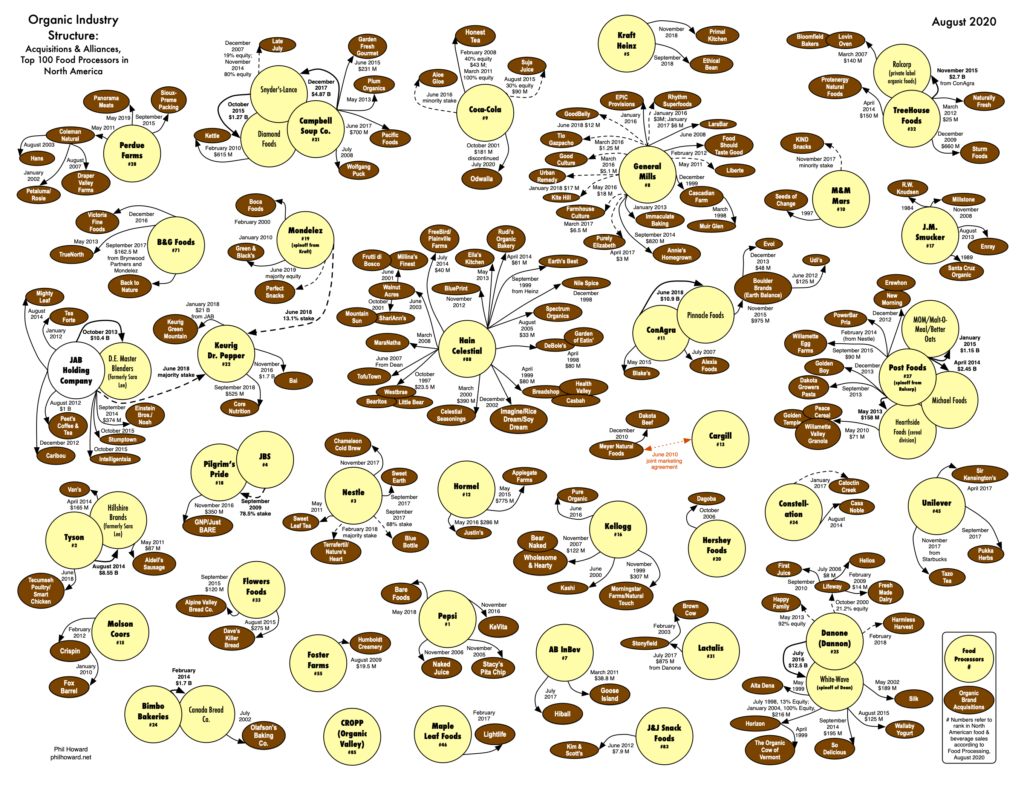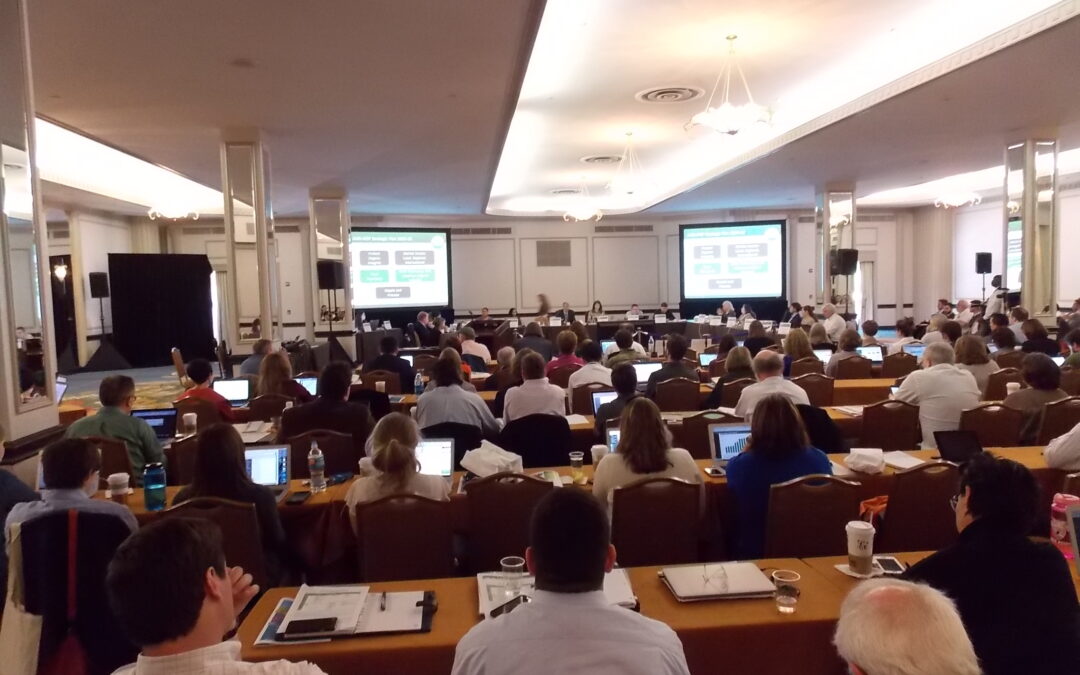Updated White Paper Profiles Lobbyist-Affiliated Appointees to National Organic Standards Board
THE STORY: A QUICK OVERVIEW
• As giant agribusinesses consolidated their marketplace power in organics, corporate lobbyists have achieved dominance in rulemaking, regulations, and enforcement.
• USDA Secretary Vilsack has ignored pleas to balance the needs of family farmers and consumers and continues to stack the National Organic Standards Board with corporate-influenced members.
• Money flowing from corporations, and from the USDA itself, to nonprofits and certifiers has created industry cheerleaders (“enablers”) facilitating the switch to livestock factories, hydroponics, and incidents of massive fraud in the $60+ billion-year industry.
• The USDA organic seal has come to simultaneously represent two very different systems of agriculture, with authentic organic brands and local and regional farmers primarily connecting with shoppers at farmers markets, CSA’s, and cooperative/independent retailers. OrganicEye’s video series, Kastel’s Kitchen, reveals some of the secrets to decoding the marketplace and brands when shopping.
LA FARGE, Wis. — Continuing a trend well-established by prior Republican and Democratic administrations, the two newest appointees to the National Organic Standards Board (NOSB) have extensive current and/or past relationships with the industry’s major lobby group, the Organic Trade Association (OTA). The new board members attend their first meeting in Atlanta from April 25-27.
The NOSB was created by Congress through the Organic Foods Production Act of 1990 to establish the direction for the US Department of Agriculture’s (USDA) National Organic Program and act as a buffer against agribusiness lobbyists in recognition of the fact that the importance of organic foods from the perspective of consumers, family farmers, and environmentalists was not shared by the USDA.
Big Food has consolidated ownership of most of the largest and best-known organic brands. At the same time, the USDA has been criticized for “stacking” the board, which is charged with guiding the regulatory oversight of organic farming and food production, with members from, or friendly to, corporate interests.
OrganicEye, a national public interest group based in Wisconsin and best known as an organic industry watchdog, has issued an industry briefing paper profiling the reach of the industry’s most powerful lobby group, the Organic Trade Association into the NOSB.
OrganicEye’s analysis of the board shows that 80 percent of the 15-member body are intimately affiliated with the OTA as individual members, through their employers, and/or in some other professional capacity.

The board was established to ensure that the voices of organic farmers and consumers drove the direction of the USDA’s organic program when there was grave concern about handing over the budding organic farming movement to conventionally-focused USDA political appointees and bureaucrats and the corrupting influence of corporate money.
“Past administrations, including Secretary Thomas Vilsack’s first stint during the Obama administration, have favored appointing members to the NOSB who were affiliated with the Organic Trade Association. The Secretary has ignored our appeals to elevate the voices of the NGO community in comparison to the corporate lobbyists,” said Mark A. Kastel, Executive Director of OrganicEye.
In addition to the shift to corporate-friendly NOSB members, the Obama/Vilsack administration’s USDA stripped the congressionally-empowered panel of its ability to set its own agenda and work plan. “Recent history has made a mockery of the original intention of the board to act as an independent body receptive to the interests and concerns of all organic stakeholders,” Kastel continued.
“I’ve attended too many NOSB meetings and watched industry players pay lip service to the integrity of organics while voting to include materials in organic food, even carcinogenic materials, like carrageenan and nitrate-rich conventional celery powder for processed meats,” said Jim Gerritsen, OrganicEye’s board chair and an organic farming elder from Maine.
“When there was a healthier balance of power on the board, and they flexed their muscles by, for example, banning antibiotic use on tree fruit in organic production, members of the OTA, including the previous employer of one of the new NOSB appointees, called the move a ‘travesty’ and suggested that the NOSB was ‘out of control,’” said Kastel. “Now the lobbyists are in the driver’s seat.”
To counter the overreliance on lobbyists to help write laws (which is all too common in Washington), OrganicEye has been strongly encouraging members of Congress, USDA Secretary Thomas Vilsack, and the members of the NOSB to create balance by amplifying the voices of the nonprofit public interest groups that have, for decades, helped launch, nurture, and monitor the growth of organics.
“The OTA has spent years, and invested untold corporate dues, in honing the persona that it is a tax-exempt nonprofit group working in the interest of the public when, in fact, it is a ruthless industry lobby group that has crossed swords with the nonprofit community on virtually every controversial issue before the NOSB,” Kastel lamented.
The two new appointees to the NOSB in 2023 are Nathaniel Lewis and Dr. Franklin Quarcoo, both filling seats designated by Congress for organic stakeholders with a background in environmental protection:
[optional editor’s cut>]
Nathaniel (Nate) Lewis
Nathaniel (Nate) Lewis currently works as the South Sound Conservation Manager for the Washington Farmland Trust in Washington State. He also owns and operates one of exceedingly few family-scale farms that are members of the Organic Trade Association. Mr. Lewis was previously employed as the Organic Certification Coordinator at the Washington State Department of Agriculture (WSDA), coming on board when Miles McEvoy, former Deputy Administrator of the National Organic Program, was WSDA’s Organic Program Manager. He later served as the Farm Policy Director at the OTA.
Mr. Lewis received (a likely unprecedented) 61 letters of support, including endorsements from the Organic Trade Association, four members of its current Board (and one current board candidate), and many other OTA members. Our review of the letters revealed a number of interesting patterns, including numerous submissions from OTA members affiliated with vertically-integrated agribusinesses producing organic eggs.
Over half the letters supporting his appointment came from individuals or entities with OTA affiliations. Over 75 percent included identical or nearly identical standardized language indicating that the push for Mr. Lewis to gain a seat on the board was part of an organized campaign promulgated either by him or some industry interest.
One such letter was from prominent industry consultant and OTA member/financial donor, Wolf and Associates, where Mr. Lewis worked as a contract consultant after leaving his position at the OTA. In 2018, he spoke on their behalf at the fall NOSB meeting.
Dr. Franklin Quarcoo
Dr. Franklin Quarcoo is an Entomologist/Integrated Pest Management Specialist who is currently an Assistant Research-Extension Professor of Entomology in the Department of Agricultural and Environmental Sciences at Tuskegee University in Alabama.
In 2022, Organic Trade Association member Clif Bar partnered with the Foundation for Food & Agriculture Research to fund a $2 million endowment intended to support Dr. Quarcoo and a colleague in developing a network of organic research among Southeast academic institutions, with a focus on historically Black colleges and universities, in an effort to promote the adoption of organic farming practices and increase equity in organic farming. The Foundation for Food & Agriculture Research frequently partners with the OTA’s nonprofit arm, The Organic Center, to fund organic research and training. Dr Quarcoo also participated in “Endowed Chair Office Hours” at the Clif Bar booth at Natural Foods Expo West, an industry tradeshow.
Dr. Quarcoo received a single letter of support from the National Organic Coalition (NOC).
[<optional editor’s cut]
OrganicEye’s Mr. Kastel said the organization would assume that all NOSB members will carry out their duties objectively to serve the overall public and will not criticize any individuals unless their established voting records demonstrate a basis for concern. “Our concern is the influence the OTA lobbyists have, in aggregate,” added Kastel.
As it has done previously, OrganicEye filed a request under the Freedom of Information Act (FOIA) for the application packages of all nominees to the board, including some eminently qualified, but less politically connected, candidates that were passed over.
“I was cautiously optimistic that the noise made by OrganicEye members, and others in the organic community, might be having an impact,” said Kastel. “Just as some past Supreme Court Justices, appointed by ideologue-presidents, proved themselves to be independent jurists, some NOSB members recruited by the OTA have ended up being much more independent and committed to true organic integrity than might have been anticipated.”
For instance, OrganicEye views Dr. Quarcoo as doing meritorious work on behalf of underrepresented farmers and said it hopes he will prove to be sensitive to family-scale producers who are being economically disadvantaged as corporate interests increasingly usurp the economic opportunities in organic farming just as they have in conventional agriculture.
“We have pretty much given up on trying to influence Secretary Vilsack given his coziness with the corporate lobby selling-out the interests of family farmers and dedicated organic eaters,” stated Kastel. “We are continuing to attempt to convince his boss, President Biden, to intervene on behalf of the family farm community.”
-30-
MORE:
OrganicEye continues the fight against weakening the NOSB through their consumer education and other efforts, including focusing attention on marketplace activism in an effort to save organics.
Some of the most prominent, and still independently owned, brands in the organic industry have made their opinions clear concerning the activities of the Organic Trade Association by very publicly resigning their memberships. These businesses include Nature’s Path, the largest producer of organic breakfast cereals and granola; iconic Dr. Bronner’s soaps and organic food products; and superfoods pioneer Nutiva.
A few years before his semi-retirement in 2018, and eventual resignation in 2019, from The Cornucopia Institute, co-founder Will Fantle (now an OrganicEye board member) broke with his tradition of attending biannual NOSB meetings.
“The game is rigged,” Mr. Fantle lamented.
“The USDA’s trick is that they give us two or three exemplary appointees on the board at any one time and, on some votes, there are a few of their more independent colleagues who will follow their lead. But it’s generally never enough to be effective in terms of promulgating policy that protects and defends the organic farming movement.”
Pioneering organic farmers who lobbied Congress to pass the Organic Foods Production Act won approval for a provision that pushes the board towards consensus by requiring that all “decisive” votes by the board be passed with a two-thirds supermajority. Mr. Fantle continued, “The original supporters of the legislation would never have imagined the board becoming as corrupted as it has by corporate influence.”
In addition to the board being dominated by members who are affiliated with the most powerful lobby group in the industry, the voting process for synthetic and non-organic materials that are legally required to “sunset” every five years was unilaterally reversed during the Obama/Vilsack administration of the USDA’s organic program. Now, instead of requiring a two thirds vote to relist a material, a two thirds vote is required to remove materials — including some which remain on the list after having been recognized as carcinogens. OrganicEye is currently attempting an end run around the NOSB by seeking a judicial remedy to what they refer to as, “a gross betrayal of the public’s trust.”
“On controversial issues, that two thirds majority is commonly an insurmountable requirement with the board stacked with individuals from the corporate sector,” added Mr. Fantle.

